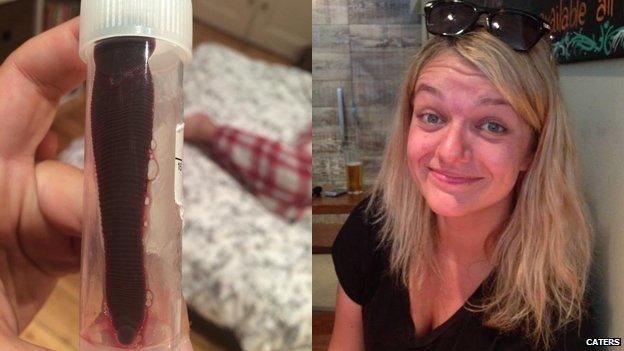The chances of finding a leech up your nose? Not likely..
- Published

When 24-year-old Daniela Liverani saw a leech wriggling in her nose, she realised she'd brought an extra souvenir home from South East Asia.
She'd been suffering from nosebleeds for weeks, but the backpacker thought it was a blood clot.
It's thought "Mr Curly" (yes, she named it) moved in when she was in Vietnam or Cambodia.
Smitha Mundasad works as a health reporter at the BBC, so we asked her to pop to Newsbeat with some reassurance.
"This was extremely rare and she was extremely unlucky," she says. "It's very unlikely that a leech can find its way into your nose or your ear, and if they're going to get anywhere it's more likely to be on your legs.
"They're not harmful, that's the most important thing in most cases. They cause no harm at all."
Hospital staff had to eventually remove "Mr Curly" with forceps and tweezers.
"They're [leeches] quite clever creatures" says Smitha, who used to be a Doctor.
"One thing they do is they inject a sort of anaesthetic into the body so you just can't feel them. "I've had some myself, I haven't felt them for hours. They also inject an anti-clotting chemical into your body too and that's why she was having nose bleeds."

Smitha Mundasad is a health reporter at the BBC
Advice?
Smitha Mundasad suggests talking to people in the area.
"They know about the season and what creepy crawlies there might be," she says.
"The majority of things you can prevent by wearing full layers and insect repellent.
"That also protects you against malaria, which is the one thing you've got to be careful not to get.
"If you come back to the UK and you notice something unusual, make sure you tell doctors and nurses where you've been, otherwise it can take a little while to figure out what's going on."
Anything else you could accidentally bring back?
"Bot fly is one of the things people bring back, and these tiny creatures live in places like south America, and mosquitoes carry their eggs and they can drop them into your skin as they bite you.
"They develop under your skin and you don't notice them for some time.
"So people come back and they have these big spots and lesions, that are slightly crawling sometimes, and that's when you know something's under there. They're not harmful, we just need to get them out."
Follow @BBCNewsbeat, external on Twitter and Radio1Newsbeat, external on YouTube